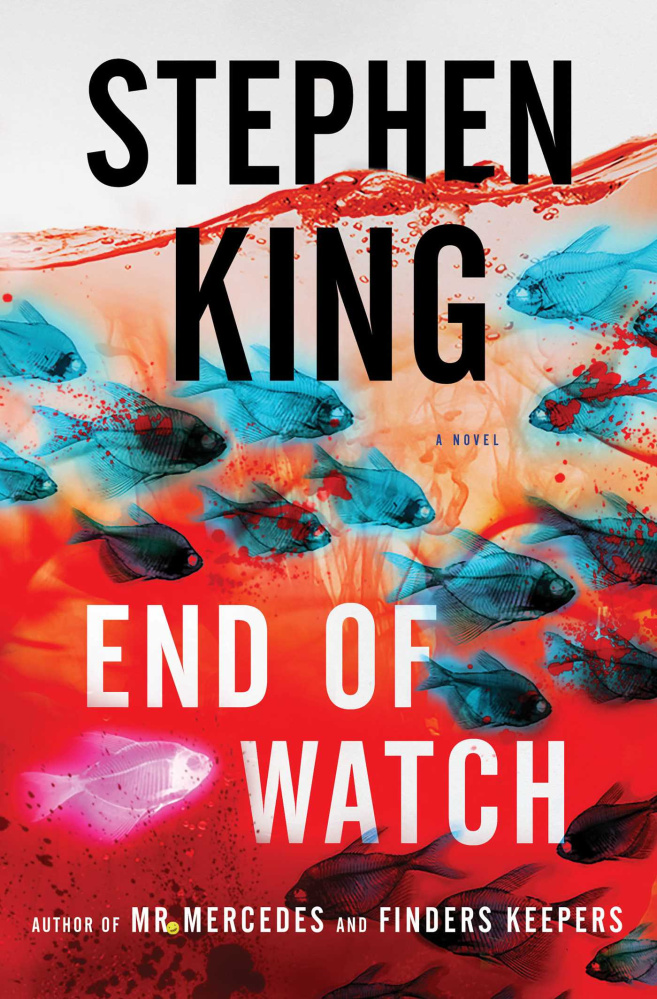“End of Watch: A Novel”
By Stephen King
Scribner, New York, 2016
448 pages, hardcover, $30
In “End of Watch,” the last installment of Stephen King’s Hodges trilogy, retired police detective Bill Hodges finds himself in a fight for his life — and an untold number of other lives — while figuring out how the vegetative hospital patient Brady Hartsfield (the mass murderer in Hodges No. 1, “Mr. Mercedes”) is managing to perpetrate his own private final solution to teenagers.
Backing up: The new book opens with a return to Day One of “Mr. Mercedes.” We travel with the first ambulance crew to arrive on the scene of the harrowing pre-dawn massacre of waiting job-seekers in 2009, the murder weapon being a flashy stolen Mercedes. We get acquainted with another of the maimed survivors. Sketched deftly in, eventually, is the backstory of Hartsfield, who got clocked by one of Hodges’ makeshift detective partners in the nick of time before blowing up thousands of teeny-boppers at a rock concert.
The second book, “Finders Keepers,” followed Hodges along a different subsequent story line altogether, centering on a family that had been egregiously impacted by the massacre. That book touches on the behospitalized Hartsfield only in association with Hodges’ uneasy suspicion that the seemingly incapacitated mass murderer may yet be capable, somehow, of further evil.
“End of Watch” tells the story of what Hartsfield has been up to while trapped in his hospital room inside a nearly nonfunctional body. His activities are predictably vile, and involve a hand-held video game device (somehow this pairing seems quite plausible). Six years after the massacre, an inexplicable suicide attracts the attention of Hodges and his now-partner, Holly Gibney (the shy, middle-aged wizard of Google searches who clocked Hartsfield at the concert). Why in the world, they wonder, would these two victims of the Mercedes disaster suddenly commit a murder-suicide? And what is this pink Game Boy-like device doing shoved down into the cushions of their couch?
Hodges, readers will recall, has had major health problems for years, both physical (heart attack at the end of “Mr. Mercedes”) and mental (contemplating suicide at the beginning), and “End of Watch” develops that theme in grueling two-pronged detail. Where “Mr. Mercedes” can in some ways be read as a book about human suffering, and “Finders Keepers” as a book about different kinds of corruption, “End of Watch” is a book about self-destruction and the conditions that foster it. Some of those conditions (such as the disposition to put off healthy behaviors until tomorrow that just get in the way today, and like the insidious effects of video games) are culture-bred realities, while others (such as Brady Hartsfield’s telepathic powers) are creep-inducing fictions. All are chilling.
While “End of Watch” is a typical King potboiler driven in equal doses by character, plot and psychic pyrotechnics, it’s also, as usual for the National Medal of Arts winner, a clever, mutilayered evocation of how our blithe everyday behaviors, in the dark hours before the dawn, need just a nudge to deteriorate into full-on self-destructiveness.
Like most of Stephen King’s stories, “End of Watch” is so evocatively realistic you’ll probably never look at a hand-held electronic game the same way again. And maybe the author hopes so. Who knows? Like the nerve-shattering ring tone on Hodges’ cellphone, this book is another walk-off home run by Maine’s most accomplished fiction writer. It’s scheduled to be released next month.
Send questions/comments to the editors.


